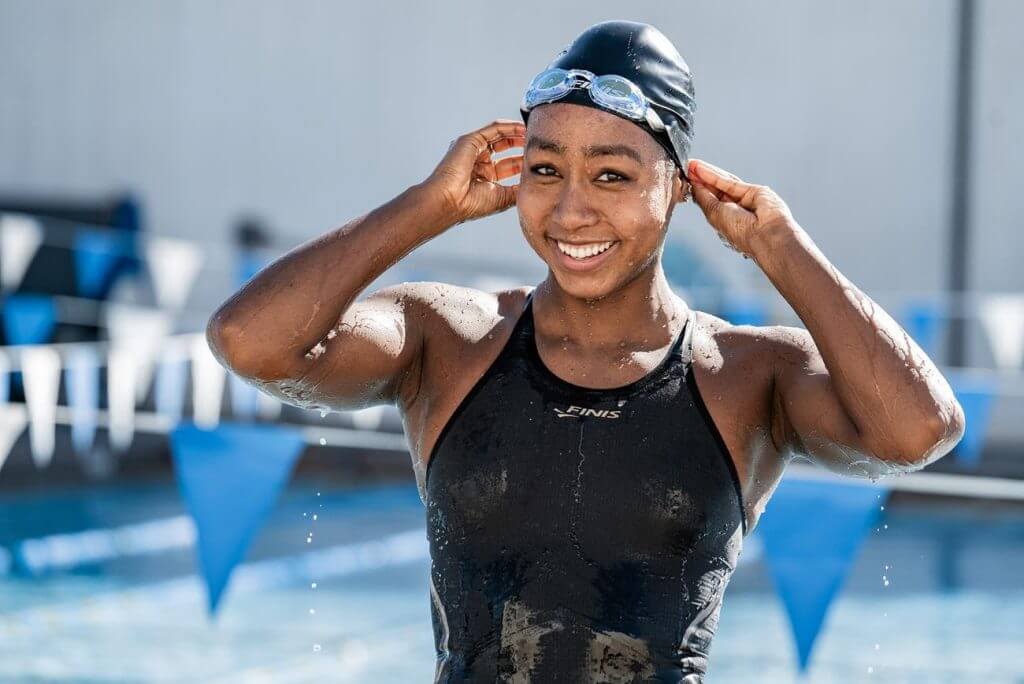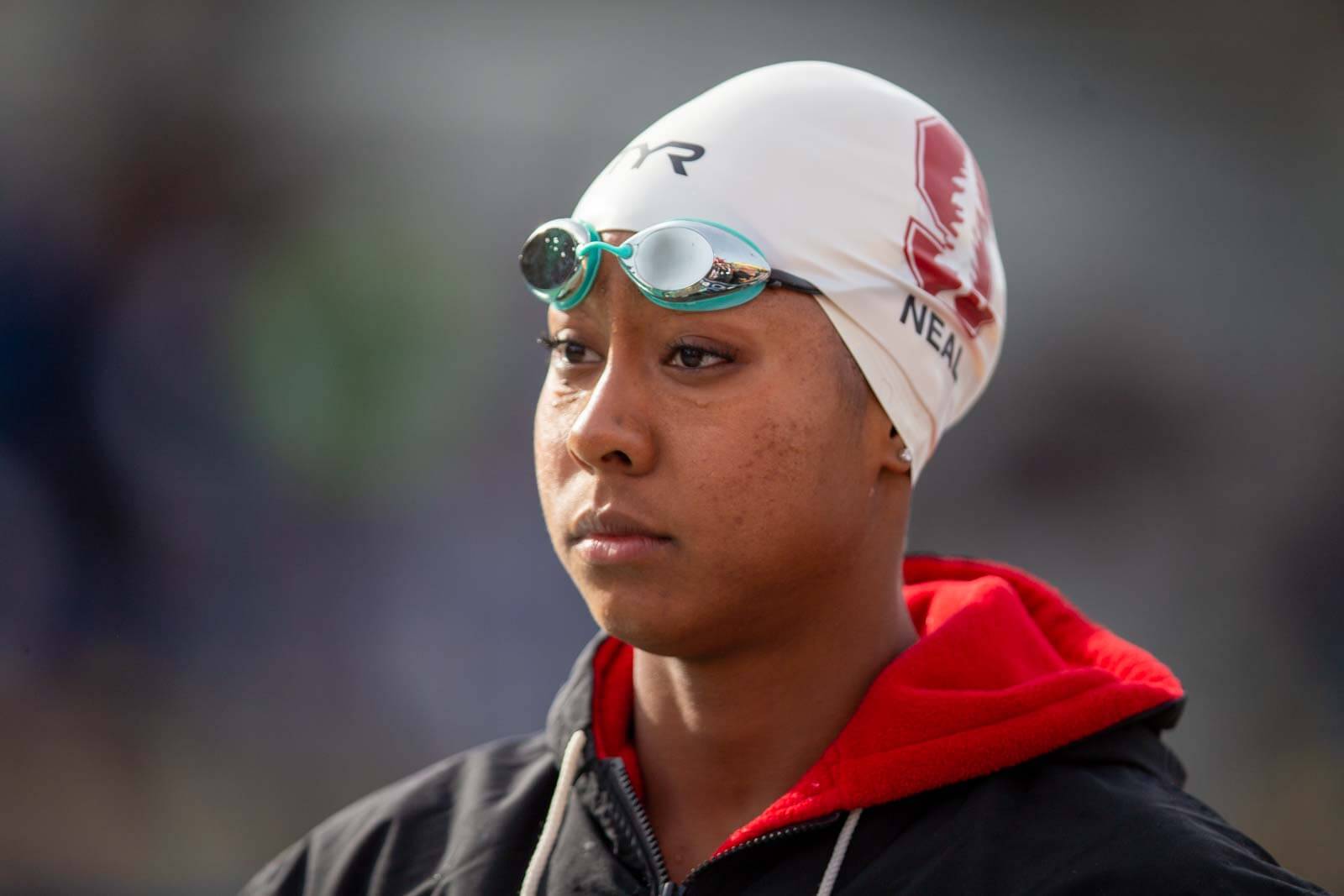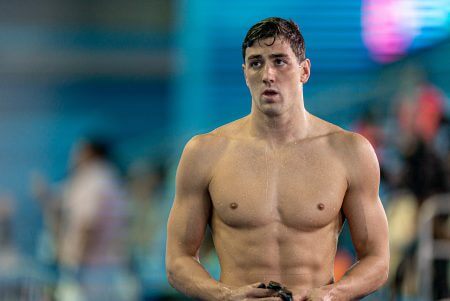Lia Neal Working for Change, Diversity and Inclusion in Swimming

Lia Neal and Jacob Pebley Working for Change in Swimming (From Swimming World Magazine)
In response to the Black Lives Matter movement, elite swimmers Lia Neal and Jacob Pebley created Swimmers for Change to promote diversity and to make swimming a more inclusive sport and a more inclusive community.
**********
In late May, the gruesome murder of George Floyd, an African American man, by Minneapolis police officers sparked a national outcry for racial justice throughout the United States and led to the invigoration of the Black Lives Matter movement. Throughout cities across the country and even the globe, protestors took to the streets to demand a dissolution of the systemic racism built into the fabric of society, justice for the black men and women inexcusably murdered by police officers and an end to police violence against minorities.
Inevitably, in short order, the Black Lives Matter movement found its way to swimming. Members of the American swimming community of all races and ethnicities began speaking out and demanding justice and change.
Meanwhile, Lia Neal, one of the pioneers for African Americans swimming on the elite level, took center stage in demanding for change both behind the scenes and in the public eye.

Lia Neal — Photo Courtesy: Becca Wyant
Neal is a two-time U.S. Olympian, who represented the U.S. in the 400 free relay at the 2012 Olympics while just 17 years old, and then again qualified for the Rio Olympics in 2016. She has won two Olympic relay medals along with five World Championship medals—and she is mixed race, of both African American and Chinese descent.
Nowadays, Neal is a steady presence on national teams, but since 2000, only five black or mixed race swimmers have qualified to represent the U.S. in the Olympics. Yes, five. Along with Neal, there have been Anthony Ervin, Maritza Correia (now Maritza McClendon), Cullen Jones and Simone Manuel. All have won Olympic medals, but each Olympic team averages 55 to 60 swimmers total, and African Americans make up 13.4% of the U.S. population. Five total swimmers over five Olympic cycles represents a sport with a glaring lack of diversity.
Black Leadership in Aquatics Coalition
Shortly after the murder that sparked the movement, Neal became a founding member of the Black Leadership in Aquatics Coalition (BLAC), a group of 14 current and former members of the U.S. national team that began working with and advising USA Swimming on racial issues around this time. Among BLAC’s earliest actions, the group worked with USA Swimming to craft a statement that reflected the premise that used the words “black lives matter” in the aftermath of Floyd’s murder, and the group has continued to work with USA Swimming to put in place new measures to promote diversity and inclusion in swimming.
“USA Swimming had released a statement that, unfortunately, all the black athletes felt was not enough and felt like it was very empty,” said McClendon, a 2004 Olympic silver medalist who serves as chair of BLAC. “They did an additional post to say they were being supportive and listening and learning. Along with that phone call came the idea (that) this is an opportunity for us to have a voice within USA Swimming and to connect with them directly—versus seeing things that get posted that we don’t agree with. We’re going to come to the table and have a discussion about what that looks like, what kind of improvements can come from USA Swimming when it comes to supporting the need to increase diversity in swimming.”
McClendon noted that USA Swimming’s membership is just 1.6% black, and that percentage has remained steady for more than a decade. “What they’re currently doing is not working,” McClendon said, so she has led the BLAC group to push for change in specific areas. They want to work with USA Swimming to speak with teams and mentor young African American swimmers, and they are also pushing for USA Swimming’s social media accounts to represent more diversity, both to educate the swimming community about black culture and to help minority athletes feel more comfortable in the sport by displaying and marketing swimmers who look like them.
Swimmers for Change
The second and more front-facing effort that Neal took up to promote diversity and inclusion came in tandem with fellow 2016 Olympian Jacob Pebley. Pebley remembers swimming at practice one day shortly after Floyd’s murder and feeling ticked off about police violence and racism. So he texted Neal, his teammate at Team Elite in San Diego, looking for ideas about what he could do to spur change.
“He was feeling what a lot of people were feeling around that time, when things were starting to really unfold in just feeling a little bit helpless,” Neal said. “Jacob came to me asking, ‘What can we, as swimmers, do ourselves?’ It just wasn’t worth it to wait for the bigger national governing body to do something because every day that was passing since especially George Floyd’s death, it was just an opportunity lost.”
That’s how Swimmers for Change came to be, as an endeavor to make swimming a more inclusive sport and a more inclusive community. “It was a way of having the same community—a predominantly white sport and white community—step up and show their support as allies for the black community to just say that black lives matter,” Neal said. “That very simple and what many would say is common sense or morally right ideology was just something that wasn’t being said.”
Pebley and Neal decided to launch a series of webcasts, two weeks of one-hour shows hosted by national team athletes. The webcasts would raise money through selling merchandise and T-shirts that would then be donated to organizations that promoted inclusion and diversity in swimming. The swimmers hosting each show chose the particular group to whom they would direct funds raised the day of their shows and then promoted Swimmers for Change through social media and their sponsorships.

Jacob Pebley — Photo Courtesy: Becca Wyant
Pebley hoped that the message of Swimmers for Change would spread and make a widespread impact, but he realized that it wouldn’t even take that much to make a significant difference.
“Nikki, my wife, told me, ‘There will be one small black swimmer that will see this and see the support, not only from Lia and Cullen, but from the white swimmers, too,’” Pebley said. “If I could just impact one person in that way with this, then it’s absolutely worth it. It’s worth it over doing absolutely nothing. For me, that’s what gave me the courage to do it, and I saw that.”
In an email to members of the national team seeking their support and participation, Pebley wrote, “The swimming community must be better, and it should start with us: the athletes that thousands of children look to for guidance not only in the pool, but also in how we choose to live our lives. The goal of Swimmers for Change is to use our unique skill sets to educate swimmers on what Black Lives Matter means, to raise money for charities that further their mission, and to promote lasting change in our country through instilling anti-racist ideals in the next generation.”
Thirty-seven elite swimmers participated over the two weeks in mid-June. Some of the swimmers told Neal they were concerned about saying the right words about the important racial issues, but Neal told them to simply focus on what their charities meant to them and why they selected those particular groups. The outpouring of genuine support for the crucial cause was heartening to Neal.
“It meant a lot. We basically just cold-called people, DM’d, texted people on the national team, and a lot of the responses were, ‘Yes, completely, we’re on board, I’m so glad that you created this opportunity.’ A lot of people wanted to do something, to help with the cause, but didn’t know how or where to start, so this gave them a way to do that,” Neal said. “You can tell that they had a deep connection and empathy with what was going on and the charity they chose. Everyone had a really poignant story just tying to why they chose their charities. It surpassed all my expectations.”
Looking to the Future
Swimmers for Change quickly proved to be an effective and timely response to the ongoing events in the world. The two weeks of webcasts captured a strong audience and raised about $15,000, split among eight charities around the country. But both Neal and Pebley see a future for this platform. While that initial venture was about acting quickly, they both envision Swimmers for Change having a much wider reach in the future. Neal wants to continue to help increase diversity in swimming and reduce drowning rates in underprivileged communities, and she believes Swimmers for Change could also take a role in promoting inclusion for the LGBTQ+ community within swimming.
In the immediate future, Pebley mentioned the possibility of hosting a nationwide virtual swim meet, with minimal entry fees raising money to support one specific community rather than spreading it out over several different organizations. “Basically, we’re going to try to get the entire country involved with a swim meet and then raise money,” Pebley said. “The goal now is to focus on one smaller charity or swimming organization, so if we do raise a lot of money, it does have a huge impact on that community.”
The push to engender change in the swimming community will not simply recede or fade away, as Pebley and Neal will continue to use their Swimmers for Change platform long past the moment in time this past June that sparked them into action.
Lia Neal Making an Impact
When Neal considers her swimming career and the impact of being one of so few African American or mixed race swimmers at her level, she knows she has made an impact on the sport and the people around the sport. But as an active swimmer pushing to qualify for her third Olympics, she doesn’t get the chance to fully appreciate that perspective. On a daily basis, she trains, races and goes about her normal routines just like any other elite swimmer.
But occasionally, she gets a message that truly touches her, perhaps a two-sentence note in her Instagram or Twitter direct messages, where a fan signals their appreciation for what Neal represents in the sport. The ones far removed from a big, televised swim meet, when she would not be at the front of most people’s minds, mean the most for Neal to receive.
“It’s been definitely enlightening to get that perspective from other people, whether that be people who’ve emailed me and messaged me, expressing to me the impact that I’ve had on them,” Neal said. “It just means a lot because it’s so important to do things for more than just yourself.
“Your swimming career is only for a moment in time, especially the Olympics, which comes every four years, and your best event is on one day, so that’s only a moment of time. I think it’s so important to have that impact and to do something that’s greater than yourself that expands beyond your one little moment.”
As far as competitive swimming on the highest level, Neal sees representation as the most crucial piece on swimming’s path toward real diversity. On former Stanford teammate Manuel winning Olympic gold in the 100 free in 2016, Neal recognizes the lasting impact of Manuel’s golden accomplishment, which transcends just the single moment. In becoming the first African American female swimmer to win an individual gold medal, Manuel allowed young black swimmers to look up and see someone that looks like them at the sport’s pinnacle. “It’s hard to forget because it made an impact and opened that door,” Neal said.

Lia Neal (L) and Simone Manuel at the 2015 NCAA championships — Photo Courtesy: Peter H. Bick
Neal considered another pioneering moment in competition, the 100 yard free at the 2015 Women’s NCAA Championships. Manuel won that race, setting an American record in the process, while Neal finished second and Florida’s Natalie Hinds placed third—a 1-2-3 finish for black swimmers. That had never happened before. The historic significance of the moment got some attention, but Neal thinks it needed more. To instill the dream for young minority swimmers to succeed in swimming, they need to see themselves represented consistently.
“Considering how not diverse swimming is at this stage, there wasn’t enough attention drawn to it. It is important while swimming remains a predominantly white sport, as it is right now, it is important to draw attention to these feats because that’s what is going to get kids to see themselves on that podium, just seeing that representation and that image more,” Neal said.
“There’s less opportunities to see that representation, but as long as we do emphasize the few people that are and really encourage more people to get within the sport, then that is what’s going to set the tone for the future generations.”



